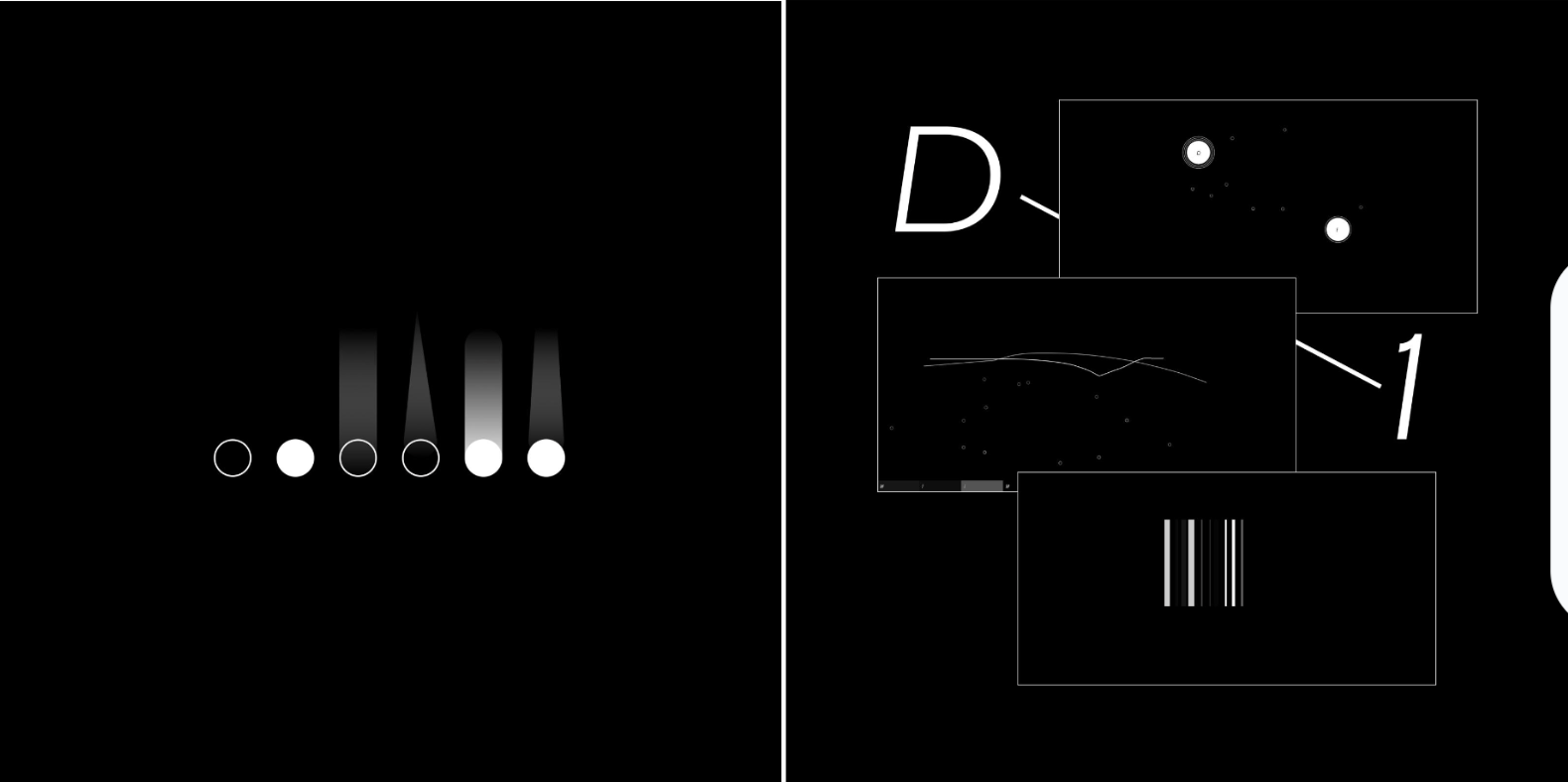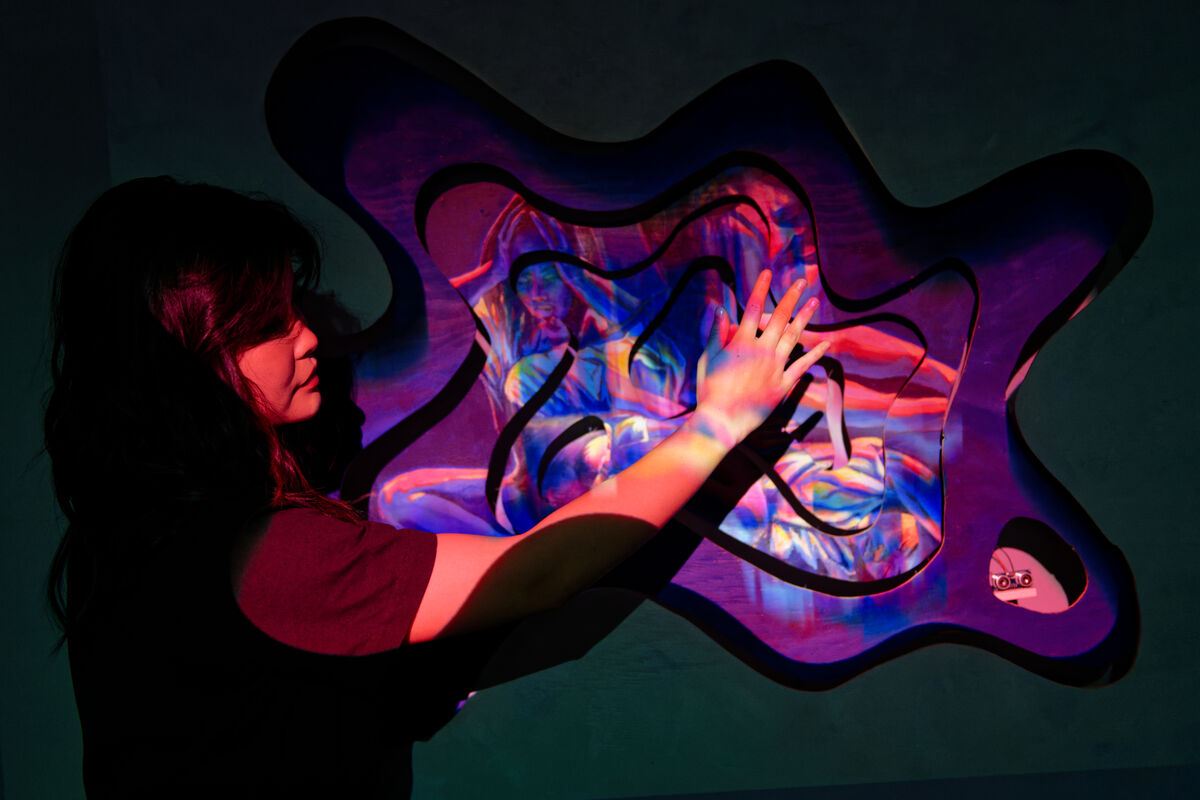Wednesday, September 20 | 6:30PM
Machine learning tools & nonhuman collaboration
Panel 1: Nonhuman Machine Learning with Ranu Mukherjee & Şerife (Sherry) Wong
Saturday, September 23 | 4PM
Machine Intelligence in Containerised Worlds

Wednesday, September 20 | 6:30PM
Machine learning tools & nonhuman collaboration
Panel 1: Nonhuman Machine Learning with Ranu Mukherjee & Şerife (Sherry) Wong
Saturday, September 23 | 4PM
Machine Intelligence in Containerised Worlds
The September 23 event is a seated program and ADA accessible.
View our FAQ page for more info, or contact us at [email protected] with any accommodation requests.
The Machine-World Interfaces Salon Series interrogates emerging tendencies across art practice which engages AI tooling. Bringing together artists which move beyond current conceptions of AI as a purely generative practice, this series looks to approaches which embed machine learning tools into complex systems and simulated worlds to explore the core affordances of the technology, beyond its capability to produce generated artifacts. We will explore simulated ecosystems, nonhuman collaboration, multi-agent interactions and synthetic forms of poetics.
Each event will be conducted in conversation with Alasdair Milne, Researcher and PhD Candidate with the Creative AI Lab, Serpentine & King’s College London.

Join Ranu Mukherjee in conversation with Sherry Wong and Alasdair Milne to discuss her ongoing research as 0rphan Drift. In its latest manifestation, 0rphan Drift considers Artificial Intelligence through the somatic tendencies of the octopus – as a distributed, many-minded consciousness.
Image credits: Distributed Consciousness. The Becoming Octopus Meditations stills, 0rphan Drift 2020. Maggie Roberts, artist. Megan Bagshaw, VFX supervision. Duncan Paterson, Visual coding. Thanks to Etic Lab for Cephalopod behaviour research and Anna Breytenbach for Interspecies communication.
Ranu Mukherjee is an artist and co-creator, alongside Maggie Roberts, of 0rphan Drift, a London-based cyber-feminist collective and avatar making combined media works since 1994. 0rphan Drift has explored the boundaries of machine and human vision, since its inception in London in 1994. The collective as avatar has taken diverse forms through the course of its career, sometimes changing personnel and artistic strategies in accordance with the changing exigencies of the time. They have participated in numerous exhibitions and screenings internationally including in London, Oslo, Berlin, Oberhausen, Glasgow, Istanbul, Vancouver, Santiago, Capetown, and the Bay Area. Their recent work If AI were cephalopod was supported by Telematic, San Francisco, where it had its premiere exhibition.
Şerife (Sherry) Wong is an artist and founder of Icarus Salon, an organization that explores politics, culture, and technology through art. She is an affiliate at O'Neil Risk Consulting and Algorithmic Auditing and Kidd Lab, UC Berkeley, and the Tech Diplomacy Network. Her advocacy work for justice in AI and more active roles for artists in policymaking has been recognized through several awards: a residency fellowship at the Rockefeller Foundation Bellagio Center, a research fellowship at the Berggruen Institute, Mozilla Creative Award, and she was listed as one of 100 Brilliant Women in AI Ethics.

Ritwik Deshpande and Akshay Sawhney of DAWN present their new sonic tooling D1 / GLIDERS. These instruments use the vocabulary of interaction design to create new affordances for machine learning models that create music directly from simulations of natural phenomenon, working to approximate organic motion through embodied interactions. While exploring their work, this discussion will focus on the constraints and possibilities of new AI deployment contexts.
Image credits: Ritwik Deshpande and Akshay Sawhney, DAWN, D1 / Gliders (2023). Image courtesy of the artists.
DAWN is a physicist / designer duo that uses machine learning to bring musical interfaces closer to the physical world. Consisting of Akshay Sawhney — a quantum physics PhD candidate, and Ritwik Deshpande — an interaction designer, DAWN aims to make digital music production indistinguishable from nature.

Ari Kalinowski of Delta_Ark conducts a playthrough of their gameworld Binah (2023), a short audiovisual presentation, and an explainer on the technical research into reinforcement learning that underpins their worldbuilding practice, exploring the connection between technical research, AI interactions, and new poetics forms. The playthrough will be accompanied by conversation with Alasdair Milne and open discussion with the audience.
Image credits: Delta_Ark, Binah (2023). Image courtesy of the artist.
Delta_Ark is a machine ecologies studio that builds synthetic ecosystems. They deploy reinforcement learning in game-world environments to simulate multi-agent interaction, modeling new ethics for possible technological transitions in the far-future. The studio’s current work is a sequence of playable, interactive virtual worlds, accompanied by audiovisual performances, that embody divergent relationships between humans, artificial agents and animals, exploring how these might be effected by future technological developments.

Alice Bucknell presents excerpts from The Martian Word for World is Mother (2022) their work-in-progress The Alluvials (2023) followed by an in-conversation and open discussion.
The Martian Word contains three Martian worlds: Green Mars presents an alternative future for Mars that’s far removed from human hierarchies. Narrated by an alien ecology and featuring its own language system built from dying and imagined languages, this world makes connections between artificial intelligence and alien intelligence. It contemplates the possibility of knowledge systems that exist outside of human cosmologies and even language itself.
The Alluvials is video work and a playable game that explores the politics of drought and water scarcity in a near-future version of Los Angeles. The story is told through a variety of nonhuman and elemental perspectives, including the Los Angeles River, wildfire, a 400-year-old sycamore called El Aliso, and the ghost of the city's celebrity mountain lion, P-22.
Image credits: Alice Bucknell, installation view of The Martian Word for World is Mother in Cypher: Narrative and Co-Evolution at Arcade Seoul 2023. Image courtesy of the artist.
Alice Bucknell (she/they) is a North American artist and writer based in Los Angeles and London. Working primarily through game engines and speculative fiction strategies, their work explores interconnections of architecture, ecology, magic, and non-human and machine intelligence. In 2021, Bucknell founded New Mystics, a digital platform merging magic and technology. In 2022, they organized New Worlds, an experimental event series expanding on emergent worlding practices, held at Somerset House Studios in London. Bucknell is currently a Somerset House Studios resident in London, teaching faculty at SCI-Arc in LA and an Associate Lecturer in MA Narrative Environments at UAL

The Creative AI Lab is a collaboration between Serpentine R&D Platform and the Department of Digital Humanities, King’s College London.
New approaches to aspects of Artificial Intelligence/Machine Learning (AI/ML) including interface design, production and engagement have emerged from artistic practices. The aim of the lab is to surface this ‘back-end’ knowledge and link it to wider artistic and curatorial practices in order to overcome the existing ‘black-box’ narratives. Through the lens of art-making, the lab produces knowledge for cultural institutions, artists, engineers and researchers on how to engage AI/ML as media. Additionally, the lab aims to develop institutional capacities to engage with these media for the benefit of the wider cultural sector.
The Creative AI Lab currently investigates:
AI tools supporting artistic practices
The changing nature of artistic and curatorial practices as a result of working with AI/ML
Creative AI as a critical practice
Aesthetics of AI/ML

As a Gray Area Member you get special access to events, behind-the-scenes content and more. Gray Area is a dedicated family of supporters who believe in the power of creative action to catalyze social transformation. Join as a member today to provide sustaining support for our globally unique arts, education, research, and incubation programs.